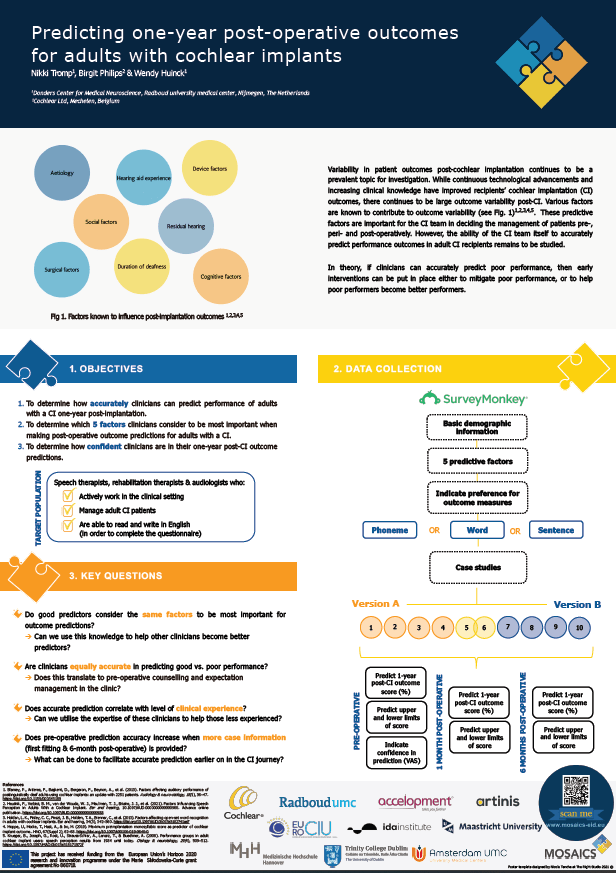Sharing and being open about scientific findings is fundamental for all researchers. Conferences are an ideal place to engage in discussions with people who are passionate about their research. Through these conferences, the ESRs have been able to share their research with the scientific community. Although most of them were held online, changing in many ways the dynamics of social interaction, these were still excellent opportunities to catch-up with colleagues and get up-to-date with the latest research being carried out by groups all over the world.
Starting in May, Nikki Tromp (ESR 3), had a poster presentation at the 15th Congress of European Federation of Audiology Societies (EFAS). There, she presented her project, looking at how audiologists and speech/rehabilitation therapists, working with adult CI users, think about post-operative outcomes. The main goal of her ongoing project, is to explore how accurately and confidently clinicians can predict one-year post-operative outcomes in adult CI users.

Nikki’s poster at EFAS 2021
During June, Loes Beckers (ESR 2) and Enrico Migliorini (ESR 4) recorded video presentations for the Virtual Conference on Computational Audiology (VCCA 2021). Enrico shared his analysis on a large database, which contained information from CI recipient fittings and their outcomes. His findings were encouraging, showing that the analysis techniques he implemented have the potential to develop fitting interventions to address poor speech recognition.
Enrico’s video presentation at VCCA 2021
Loes presented a study in normal hearing subjects, in which she evaluated measures of listening effort and cognitive skills, using cochlear implant simulations. These first steps are important for her research, helping her to define measurements that can help aid audiological assessments and revalidation of CI users.
In July, Ignacio Calderon De Palma (ESR 1) had a short presentation at the biennial symposium held by the International Evoked Response Audiometry Study Group (IERASG 2021). There he showed some preliminary data related to the assessment of auditory nerve conditions in CI recipients. Finally, that same month, Loes had a poster presentation at the Conference of Implantable Auditory Prosthesis (CIAP), where she shared a follow-up of her findings regarding her listening effort and cognitive measures.
Presenting your own research to a broader audience really changes how you view your work: do the results make sense? Are you able to communicate them to others? It forces you to take a step back and look at your research from an observer’s perspective” – Nikki Tromp (ESR 3)
A successful year in terms of academic dissemination, the ESRs engaged in useful discussions and shared their insights with a more than welcoming scientific community. The ESRs would like to extend their gratitude to all the organizers and participants of the conferences they attended. 2022 is very near and will surely bring fantastic new opportunities to continue engaging with the research community, we hope, this time, in person.
Keep updated for upcoming conference participation on Twitter @MOSAICS_2020 and on our new webpage section regarding the ESRs contributions to conferences.
